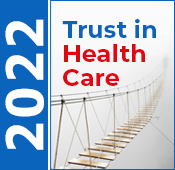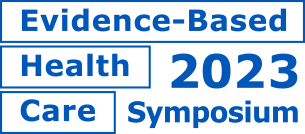12. International EBHC Symposium 2017
HTA: evidence and value in decision-making paradigm
Krakow, 11-12 December 2017
The Symposium took place in Krakow on December 11th and 12th, 2017 in Park Inn Hotel. Park Inn.
Evidence-Based Health Care is becoming a dominant direction for development of health care systems around the world. At the same time, thanks to greater awareness and increasing problems with interpreting results of studies and reviews, basic questions tend to be asked again. After so many years of EBHC development, we pose the question: what is evidence, anyway? We are searching for answers by starting with a single patient (e.g. in the case of rare diseases) and are going up to the level of the entire system – with emphasis on what values and effects we want to achieve.
This edition of our Symposium was intended as a starting point for a discussion on solutions created both in Poland and elsewhere in the world.
Currently, many countries are either analysing phenomena or are already taking actions in areas which we discuss in our sessions:
- Developing value-based health care systems,
- Changing our approach towards obtaining marketing authorisations for drugs based on adaptive pathways; challenges faced by payers in Europe,
- Comprehensiveness and integration of care in the health care system,
- Introducing new medical devices and methods of their financing,
- Clinical guidelines – how they are created, implemented and how do they impact the system,
- The situation and role of rare diseases – including in particular the active attitude of patients and the solutions they prefer.
The market of medicinal products, medical devices and all health services is becoming more and more complicated. In this multilevel structure we encounter both cooperation and competition, and conflicts of interest are not always easy to identify. It seems obvious that the primary objective of health care should be meeting the health needs of the society, which can be done by way of prophylaxis, treatment and monitoring. Each country searches for optimal solutions which would keep up with the ever-changing surroundings and possibilities (and costs) brought about by new solutions.
The aim of this Symposium was to ask: what should the shape of the system be? how should it be financed? – and most of all: what should serve as the basis for its evaluation: costs, effects, values, or political objectives? We will also attempt to find an answer to these questions together. Furthermore, we will consider whether these questions can be used as a long-term indicator for the correct direction of development and when should they be adjusted?
Partners
12. International EBHC Symposium 2017

Sessions
12. International EBHC Symposium 2017
A hand-picked panel of experts from Poland and other countries will present the results of their studies and will suggest proposals of solutions in 6 sessions:
- Directions of changes in health care systems (fee free session)
- Adapt or not to Adapt? Adaptive Pathways: a lifecycle approach in a sustainable way (fee free session)
- New solutions in rare diseases
- Patient care integration
- Evidence – synthesis and translation
- Is it necessary to regulate medical devices in the healthcare system?
Przyjęta formuła Sympozjum zakładała dłuższy czas na dyskusję z wybitnymi ekspertami zagranicznymi, co umożliwiło uczestnikom skorzystanie z ich wiedzy w szerszym zakresie niż ma to zazwyczaj miejsce w ramach tego rodzaju spotkań.
Session 1. Directions of change in health care systems
Representatives of the Polish and Belgian Ministries of Health have been invited to take part in the opening session. They will present their strategic goals and changes planned for the months and years to come. Belgium was one of the first countries in Europe to introduce a value-based systems several years back, therefore we are counting on honest reflections and first-hand experience.
Due to its exceptional educational value, the participation in the first two sessions will be free of charge. This way we want to encourage those who cannot take part in the entire Symposium – students and fellow scientists – to participate in the event. It is an opportunity to establish direct contact with representatives of the Polish Ministry of Health and The Agency for Health Technology Assessment and Tariff System (AOTMiT). We hope for a lively discussion after the session. top
Session 2. Adapt or not to Adapt? Adaptive Pathways: a lifecycle approach in a sustainable way
A broad group of stakeholders has been invited to participate in the session on adaptive pathways, including patients, representatives of registration offices and the European Medicines Agency in order to discuss problems and challenges faced by payers. top
Session 3. New solutions in rare diseases
The Symposium also has the goal of supporting and educating the invited patient associations dealing with rare diseases. The session on rare diseases will present methods for measuring patients’ preferences and practical solutions developed in France which ensure comprehensiveness of treatment. Patients’ organizations were also invited to participate in the session, thanks to which the discussion has a chance to raise all aspects and problems related to the availability of diagnosis and treatment of rare diseases. top
Session 4. Patient care integration
We are convinced that, despite many years of reform, it is necessary to continue the discussion on financing of services. Especially in view of such dynamic positive changes regarding the network of hospitals, medical devices, or integrated patient care. We hope that Polish and foreign examples of system solutions presented during the Symposium will constitute good starting points for an exchange of opinions. top
Session 5. Evidence – synthesis and translation
The session on synthesis of evidence and creating guidelines will present the latest concepts. This session will demonstrate the latest Polish and Czech solutions and the years-long engagement of Cochrane, an international organisation, in the creation of credible methodology for systematic reviews. top
Session 6. Is it necessary to regulate medical devices in the healthcare system?
In the session on medical devices, we will hold a panel discussion between representatives of the pharmaceutical industry, the public payer, experts in health care and clinicians. top
Speakers
12. International EBHC Symposium 2017
Biogram notes
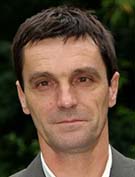
Head of the directorate Reimbursement of Medicines and Pharmaceutical Policy within the Health Care Department at the National Institute for Health and Disability Insurance (NIHDI RIZIV/INAMI) in Belgium. He manages the departments responsible for administrative and scientific assessment and appraisal of reimbursement claims for medicines, orphan drugs and medical nutrition. Francis Arickx is the former secretary general for the Commission for Reimbursement of Medicines and acts as representative/expert for the Institute and Belgium on a number of national and European platforms (NM CAPR, MEDEV, MoCA). He is one of the country coordinators for the BeNeLuxA Initiative www.beneluxa.org. Francis graduated in pharmaceutical sciences from the University of Ghent, Belgium and teaches Health Policy in the Pharmaceutical Sciences Department at the University of Antwerp. top
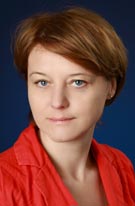
Kierownik Ośrodka Przeglądów Systematycznych Polskiej Filii Cochrane oraz Kierownik Katedry Epidemiologii i Medycyny Zapobiegawczej Uniwersytetu Jagiellońskiego Collegium Medicum w Krakowie. Od 2005 roku prowadzi zajęcia z Evidence Based Medicine dla studentów Wydziału Lekarskiego, Szkoły Medycznej dla Obcokrajowców i studentów studiów EuroPubHealth. Z Cochrane Collaboration współpracuje od 2000 roku, jest autorką i współautorką kilku przeglądów Cochrane. Jej zainteresowania badawcze skupiają się wokół Evidence Based Medicine, szczególnie przeglądów systematycznych oceniających skuteczność różnych interwencji terapeutycznych, a także aspekty metodologiczne badań klinicznych oraz wytycznych postępowania i wdrażania ich zaleceń do praktyki klinicznej. Jest także współautorką rozdziałów w podręczniku pt. “Podstawy EBM, czyli medycyny opartej na danych naukowych dla lekarzy i studentów medycyny” (2008). W ramach Cochrane jest Dyrektorem Cochrane Polska, współpracuje z Cochrane Tobacco Addiction Groups, Cochrane Renal Group, Cochrane Hepatobiliary Group, Cochrane Skin Group, Cochrane Stroke Group i Cochrane Vascular Diseases Group. top
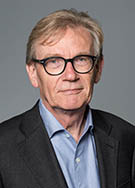
André is responsible for regulatory innovation at Lygature, an independent Dutch foundation fostering public-private partnerships in the development of medicines and medical technology. He is leading the Escher project. Currently André is coordinator of the IMI project ADAPT SMART. He has built up his regulatory experience, both with an European regulatory agency (as Head of Clinical Assessment and as Chief Executive Officer at the Dutch Medicines Evaluation Board) and with major pharmaceutical companies (senior management positions with MSD, Schering Plough, Organon). top
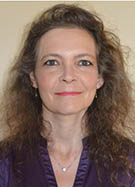
Myriam is currently project manager at the French National Health Network for Rare Diseases dedicated to the congenital malformations of head, neck and teeth, in Paris. The network coordinates at the national level the actions of all the stakeholders of this group of rare diseases, in order mainly to improve the patient care, to stimulate research and to develop information, training and education. She works notably on medical classifications and rare disease coding, and on improving social care. After graduation with a PhD in molecular and cellular biology of development, she taught molecular genetics and embryology for 3 years in a French university. Afterwards, she worked several years in industry during which she specialized in information science, in particular in data classification and controlled vocabularies, in the medical field. From 2010 to 2015, she led the Orphanet disability project, at the headquarters of Orphanet, the international portal for rare diseases and orphan drugs; it aims to describe the consequences on the patient functioning of each of the rare diseases. She collaborates with EURORDIS, the European alliance of rare disease patient organizations, as scientific contributor for improving social care and promoting the incorporation of rare diseases into social services and policies in each European country. top
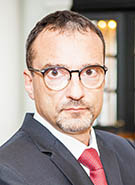
Wiceminister Zdrowia Inicjuje, koordynuje i nadzoruje wykonywanie zadań przez Departament Polityki Lekowej i Farmacji. Nadzoruje działalność Administratora Systemu Monitorowania Wypadków Konsumenckich. Nadzoruje działalność Narodowego Instytutu Leków w Warszawie. Jest profesorem Politechniki Warszawskiej, absolwentem Wydziału Lekarskiego Akademii Medycznej w Warszawie. Posiada 2 specjalizacje: w zakresie epidemiologii oraz zdrowia publicznego. Ukończył program Master of Business Administration (International MBA) w Szkole Biznesu Politechniki Warszawskiej, Studium Ekonomiki Zdrowia na Wydziale Ekonomicznym Uniwersytetu Warszawskiego, Wydział Inżynierii Produkcji Politechniki Warszawskiej w zakresie programu studiów doktoranckich w dziedzinie zarządzania, odbył staże i szkolenia zagraniczne m.in. w York University, University of Liverpool w Wielkiej Brytanii, McMaster University w Kanadzie. Jest wykładowcą w Szkole Biznesu Politechniki Warszawskiej, współpracuje z Wydziałem Zarządzania Uniwersytetu Warszawskiego, przez 9 lat pracował jako adiunkt w Zakładzie Farmakoekonomiki Wydziału Farmaceutycznego Warszawskiego Uniwersytetu Medycznego. Od 10 lat jest członkiem Zarządu Polskiego Towarzystwa Farmakoekonomicznego, pełniąc w przeszłości rolę Prezesa, a obecnie Prezesa-elekta tej organizacji. Aktywnie działa w międzynarodowym towarzystwie naukowym International Society for Pharmacoeconomics and Outcomes Research. Jest członkiem założycielem oraz członkiem władz Polskiego Towarzystwa Opieki Koordynowanej. Brał udział w tworzeniu wytycznych oceny technologii medycznych AOTMiT. Jest autorem ponad 200 prac i doniesień z dziedziny zarządzania, ekonomiki zdrowia, farmakoekonomiki i jakości życia, publikowanych zarówno czasopismach zagranicznych jak i polskich. Był promotorem ponad 100 prac magisterskich i dyplomowych, jest członkiem grup roboczych (m.in. Polskiej Akademii Nauk), rad redakcyjnych oraz naukowych czasopism specjalistycznych, pełni rolę recenzenta prac badawczych (m.in. jako ekspert Narodowego Centrum Nauki), prac doktorskich i książek, artykułów naukowych, brał udział w realizacji grantów naukowych m. in. pochodzących z Unii Europejskiej. Pracował w międzynarodowym środowisku biznesowym i doradczym odpowiadając za kwestie związane ekonomiką zdrowia oraz Real World Evidence. Został uhonorowany nagrodami JM Rektora Warszawskiego Uniwersytetu Medycznego, w tym nagrodą indywidualną naukową pierwszego stopnia, nagrodą JM Rektora Politechniki Warszawskiej za program edukacyjny oraz nagrodą “Best and Brightest” firmy PwC. top
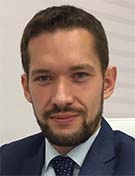
Director of the Healthcare Services Department at the Agency for Health Technology Assessment and and Tariff System (AOTMiT). He graduated from the Faculty of Pharmacy at Jagiellonian University Medical College (CMUJ) in Cracow (2002) and the post-graduate programme: MBA for Medical Personnel at the Kozminski University in Warsaw (2010). Doctoral Student at the Warsaw School of Economics (SGH). His work experience includes teaching at universities on subjects related to pharmaceutical law, pharmacoeconomics and organisation of the healthcare system. He has also worked as reimbursement director in national and central structures in the pharmaceutical industry and as an analyst and specialist in projects regarding access to medical care and quality management. President of the technical unit in the Fair and Affordable Pricing project, implemented within the Visegrad Group, a member of the Executive Committee of the POINTer project dedicated to the system of quality indicators. At the AOTMiT he is responsible for i.a. projects related to transformation of the guaranteed services system, with focus on medical rehabilitation, coordinated care and issues concerning clinical practice guidelines. top
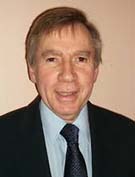
Brian works with the World Health Organization, governments, health authorities and health insurance companies across continents including Africa, Asia, Europe, Middle East, and South America to enhance prescribing efficiency within scarce resources. This includes potential ways to value and fund new medicines including those for cancer and orphan diseases incorporating suggested models to optimize their use post launch. This has resulted in multiple publications (over 150 listed in Pub Med since 2008) and presentations to address these key issues. top
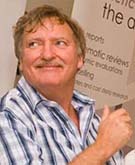
Reader in Health Economics and Director of Liverpool Health Economics and Visiting Professor at Hacettepe University (Ankara) Dr Haycox is a Global Health Economics expert who achieved a four star assessment in the 2015 RAE. He has extensive experience of applying health economics in practice including five years as a member of the Appraisal Committee of the National Institute for Health and Care excellence (NICE) and five years as Regional Health Economist in the North West of England. Widely acknowledged international expert on HTA who has been a keynote speaker on Health Technology Assessment in over 27 countries in the past ten years. Over 140 publications, 3 published books with a fourth currently awaiting publication. Editorial Board Member and referee for over 50 international journals. Co-applicant on research applications valued at over Ł2,000,000 in the last five years and expert reviewer for the NIHR, MRC and a wide range of national and international research funding bodies. Extensive experience in developing and implementing structures of Health Technology Assessment and associated training in a wide range of middle and low income countries. Established expertise in the development of health economic programmes at the undergraduate, postgraduate and executive training levels. Currently leading the UK programme in the establishment of an international postgraduate programme in Health Technology Assessment funded by the Erasmus Mundi Programme in collaboration with five other Universities throughout Europe. Dr Haycox has extensive experience and expertise in health economic evaluations in a broad spectrum of disease groups and interventions. In addition to publishing extensively in peer reviewed journals such as the BMJ and Pharmacoeconomics, Dr Haycox has authored a large number of Health Technology Assessment Monographs. Dr Haycox is a founding director of the Liverpool Technology Assessment Reviews unit which works directly on evaluations to inform decision making by NICE. For the past four years he has been a member of the NICE Technology Appraisal Committee which decides on the introduction of new drugs into the British National Health Service. top
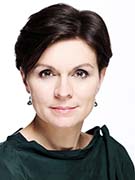
Advises companies and industry organisations on healthcare law, especially the Pharmaceutical Law, the Reimbursement Act and the Act on Medical Activity. Paulina is also a co-founder of the Lege Pharmaciae Foundation, a non-governmental organisation formed to analyse and hold a public debate on defects in legal regulations in the healthcare sector. Paulina Kieszkowska-Knapik works with the Civic Legislation Forum at the Stefan Batory Foundation on the introduction of European lawmaking standards in Poland. Recommended for many years by Polish (Rzeczpospolita and Dziennik Gazeta Prawna) and international (Chambers Europe, PLC Which Lawyer) rankings as the best specialist in pharmaceutical law in Poland. She advises patient organisations pro bono, including the Polish Coalition of Cancer Patient Organisations, the Alivia Foundation and the Federation of Polish Patients. Paulina worked at Baker & McKenzie law firm for a decade, having previously worked at CMS Cameron McKenna. top
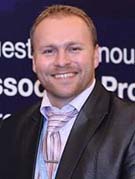
Director of the Czech Republic (Middle European) Centre for Evidence-Based Healthcare: A Joanna Briggs institute Centre of Excellence and Assistant Professor at Department of Social Medicine and Public Health, Palacký University Olomouc, Czech Republic. He is also adjunct Associate Professor of Translational Health Sciences, at Faculty of Health Sciences, University of Adelaide, Australia and Co-Chair of European Joanna Briggs Collaboration. Miloslav is focused on the development, implementation, advocacy and teaching of Evidence-Based Healthcare, especially on the evidence synthesis. He is member of international method group of Joanna Briggs Institute, who developed methodology of systematic reviews of diagnostic test accuracy. As a member of JBI GRADE center, is Miloslav focused on the implementation and improvement of GRADE methods within systematic reviews and clinical practice guidelines, and as a member of ASPHER v4 Public Health group he is focused on the strengthening of Public Health competencies in V4 Public Health workforce through the Evidence-Based approaches and international collaboration. top
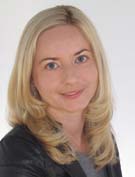
Expert in health technology assessment and health economics. For several years she has been specialising in quality assessment (audits) of analyses included in HTA reports. Author and co-author of systemic studies in healthcare and scoping aiming at determining the directions and scope of analyses required for reimbursement and pricing purposes. Partner in HTA Audit. Active instructor in the fields of EBM, HTA and Pricing in public institutions and the pharmaceutical industry. top
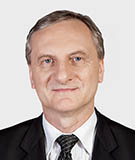
Former Deputy director of the Agency for Medical Technology Assessment and an adjunct professor at the Institute of Public Health of the Jagiellonian University. From 2009 to 2011 he was on the board of Pfizer Polska sp. Z oo. Then he was the director of the Drawski Specialist Center (2012-2013) and the Specialist Hospital. S. Żeromski SPZOZ in Cracow (2013-2016). Undersecretary of State at the Ministry of Health. He is an honorary member of the College of Family Physicians in Poland. In his account he has, among others. Delegation of the Baltic Sea Task Force (later Northern Diamension) Experts Group for Primary Health Care and EQUIP - European quality workshop group. He was also an expert on the World Health Organization and the World Health Organization, as well as the project manager for the Data for Decision Makers project (Harvard-Jagiellonian Consortium for Health). top
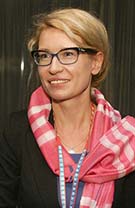
Director at the Lazarski University’s Institute of Interdisciplinary Studies for rare diseases, lecturer at the Postgraduate Education Centre, president of the Polish Association of Support for Prader–Willi syndrome (PWS) Patients, expert on health matters at the Jagiellonian Club’s Analyses Centre, vice-president of the Polish Society of Medical Communication. top
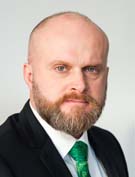
Krzysztof Łanda, M.D., consultant in DBSE and a member of the international Dentons Pharmaceutical Law and Health Care team. Krzysztof was Deputy Minister of Health in 2015-2017 and was responsible for drug policy, reimbursement and prices of medical devices, mapping of health needs, investments in health care, prices of health services and the basic benefits package. Krzysztof was previously the CEO of HTA Audit, a company dealing with the quality assessment of HTA reports addressed to authorities and public institutions and the President of the Watch Health Care Foundation. In 2010-2011 he was President of the Central & Eastern European Society of Technology Assessment in Health Care. In 2006-2007 was a Director of the Drug Policy Department in the Central Office of the National Health Fund. In 2004 Krzysztof was elected to the Board of Directors of Health Technology Assessment International (HTAi) where he remained until mid-2007. In 2010-2012 Krzysztof led capacity building in HTA in Ukraine, and in 2006-2008 in Serbia. He was a team leader of a World Bank project aimed at introducing EBHC principles in Serbia. top

Vinciane is director of public affairs at SANOFI where she is responsible for rare diseases and specialty care. She has collaborated to IMI ADAPT-SMART work package 3. She is the co-chair of the European joint industry task force on rare diseases and orphan medicinal products. (A joint task force between European Federation of Pharmaceutical Industries and Associations (EFPIA) and the European Association of Bioindustries (EuropaBIo)). Previously she worked 8 years at Genzyme medical department on diagnosis, registries and product development for rare genetic diseases. She also worked at Solvay Pharma and Wyeth. top
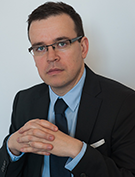
President of HTA Consulting since 2006, he is one of the founders of the company. Robert - master of economy by education (Cracow University of Economics), started his career in the Polish National Centre for Quality Assessment in Health Care. Robert is the author of many publications on HTA and health care and as advisor to the World Bank he participated in projects conducted in Serbia. Robert heads the Economic Analyses Department and carries out projects in Asia and Australia. Calm and common sense are Robert's second nature. top

Csilla Pozsgay is currently the General Director of the National Intitute of Pharmacy and Nutrition in Hungary. She graduated from medicine at the Semmelweis University (Hungary). She has two medical specialisations: reumatology and physiotherapy. She has experience in managing clinical trials and acting as regulatory expert and supporting clinical trial submissions. From 2011 till 2013 she was Director of Medical and Scientific Affairs at National Institute of Pharmacy (Hungary). Then she was a Medical Director at MSD Magyarország Kft. (2013-2015). top
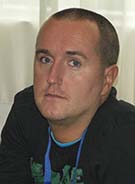
Graduated from the Faculty of Computer Science of the University of Silesia, profession IT specialist. As a patient, actively involved in patient organizations for over 20 years. Board Member of the Polish Neuromuscular Diseases Association (PTCHNM) and European Alliance of Muscular Dystrophy Associations (EAMDA Slovenia). Co-organiser of many national conferences for patients with muscluar dystrophy. In private life - enthusiast of new technology and modern devices facilitating mobility. top
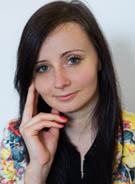
Paulina Rolska
Praktyk EBM. Specjalista ds. Ekonomiki Zdrowia w dziale Market Access w GlaxoSmithKline. W latach 2016 do 2017 zajmowała stanowisko Market Access Consultant w HTA Consulting. Od 2014 do 2016 roku współpracowała z firmą MedInvest Scanner, zajmującą się oceną ryzyka inwestycyjnego w innowacyjne nielekowe technologie medyczne oraz due diligence. W latach 2013-2014 audytor w firmie HTA Audit, zajmującej się oceną jakości analiz wchodzących w skład raportu HTA. Autorka wielu publikacji. Prowadzi szkolenia HTA EBHC. Współautorka projektów: “Pro Aegrotis Oncologicis – podstawowe założenia, kierunki i wstępne propozycje zmian systemu opieki onkologicznej w Polsce” oraz “Koszty pośrednie w ocenie technologii medycznych – metodyka, badanie pilotażowe i rekomendacje.”
Doktorantka Wydziału Lekarskiego na Uniwersytecie Jagiellońskim Colllegium Medicum. top

Prezes Zarządu Fundacji Lege Pharmaciae. Absolwentka Wydziału Farmacji Uniwersytetu Medycznego w Warszawie (1995) oraz podyplomowych studiów w zakresie zarządzania prowadzonych na Uniwersytecie Łódzkim we współpracy z Uniwersytetem w Lionie we Francji (1996), z ukończonym kursem “European Regulatory Affairs Course” organizowanym pod auspicjami EMEA (2002). Wielokrotny reprezentant Związku Pracodawców Innowacyjnych Firm Farmaceutycznych INFARMA, w pracach parlamentarnych nad kolejnymi nowelizacjami Prawa Farmaceutycznego. Członek Zespołu ds. Nowelizacji Prawa Farmaceutycznego powołanego przez Ministra Zdrowia (2006). Wykładowca w Collegium Medicum Uniwersytetu Jagiellońskiego oraz na Uniwersytecie Łódzkim. W latach 1997-2008 dyrektor ds. Rejestracji i Regulacji Prawnych w Berlin-Chemie / Menarini Polska Sp. z o.o. Od 2009 r. prowadzi własną firmę doradczą specjalizującą się w szeroko rozumianych kwestiach regulatorowych. Współfundator Fundacji Lege Pharmaciae zajmującej się krzewieniem zasad dobrej legislacji w sektorze ochrony zdrowia. top
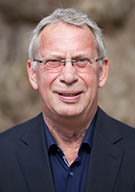
Head of Business Contact Centre and International Affairs of the Dutch National Health Care Institute (ZIN). President of the Medicines Evaluation Committee (MEDEV) Ad Schuurman completed his study in Utrecht as a clinical psychologist in 1980. He subsequently worked for five years as head of a patients’ association. In the following years, as staff officer of a regional Institute for Mental Health, he organized the cooperation the Regional Institutes for Mental Health and the other healthcare organisations. After spending several years as manager of the national project relating to pharmacy therapeutic decision making, he became head of a geriatric department. In the meantime he completed studies on management consultancy and on business administration (MBA). As deputy director of the Dutch College of General Practitioners (NHG), he set up the Electronic Prescription System. In recent years, as manager of the Pharmacy department, he was responsible for the pharmacy-related activities of the ZIN. Since 2006 he was head of the Reimbursement Department, covering all healthcare reimbursement issues in the Netherlands. In 2006 he became President of the Medicine Evaluation Committee (MEDEV) in Brussels, in which reimbursement authorities of 20 EU countries cooperate. Since 2010 is Ad Head of Business Contact Centre and International Affairs of the National Health Care Institute (ZIN). top
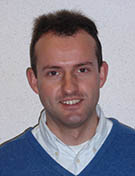
Steven Simoens currently is a full Professor of health economics at KU Leuven. Since 2011, he is a member of the board of the Department of Pharmaceutical and Pharmacological Sciences at KU Leuven. Since April 2013, he is the head of the unit Clinical Pharmacology and Pharmacotherapy in the Department of Pharmaceutical and Pharmacological Sciences at KU Leuven. Steven Simoens is a Commercial Engineer (KU Leuven, 1997), who later specialised in health economics and obtained a MSc in Health Economics (University of York, 1998) and a PhD in Economics (University of Aberdeen, 2001). top
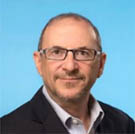
President and CEO at Anchor Bay Consulting. He was Vice President of Global Health Economics, Policy and Payment for Medtronic’s CardioVascular Division. In this role, he was responsible for ensuring that reimbursement is a consideration in every functional area from product conception, through research and development, clinical and regulatory affairs, product launch and marketing. Prior to joining Medtronic, Mr. Sugarman worked at Kaiser Permanente for 19 years initially as the Director of a clinical genetics department, and later as the Director of Medical Technology Assessment. This position involved tracking new drugs, devices and procedures as they moved from experimental to non-experimental, and determining whether they should be part of the medical armamentarium. Critical issues evaluated included safety, efficacy and cost-effectiveness. top
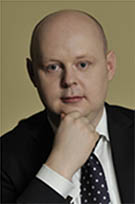
Wojciech Szefke has a master's degree in law, history and administration of the Nicolaus Copernicus University in Toruń. In the years 2003-2007 he acted as legislator of the Ministry of Health, was responsible for preparation of bills, drafting legal analyses and cooperation with legal departments of EU institutions. Deputy Public Finance Auditor. He has been a university lecturer for approx. 11 years. Wojciech Szefke graduated from Legisative Studies. Since 2007 his clients include key companies in the medical devices market. He has cooperated with the National Chamber of Commerce for Medical Devices POLMED for 7 years. President of the Board of the Medical Industry Employer Organisation Technomed. Author of numerous publications on the medical devices market and public procurement law. top
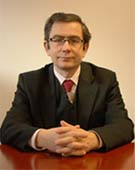
Doctor of Health Sciences, a graduate of the University of Łódź, obtained his scientific title at The Medical University of Łódź. Deputy Director of The Department of Analyses and Strategy in The Central Office of the National Health Fund, lecturer at The Humanities and Economics Academy in Łódź. Between 1987 and 2005 he worked and held managerial positions in the State Pharmaceutical Supply Company “Cefarm”. Since 2005 he has been working at the Central Office of the National Health Fund. In 2012 he obtained postgraduate diploma of Database Studies. Currently, he deals with analysis of large data sets concerning actual clinical practice. Author and co-author of dozens of articles published in national and international journals in the field of medicine and economics, discussing medical data analyses, financing in the health care system, epidemiology, pharmacoeconomics. Member of the Transparency Council of the Agency for Health Technology Assessment. top
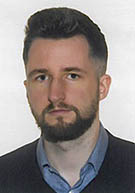
Attorney-at-law, senior associate at FAIRFIELD Law Firm (previously: DFL Legal), legal expert at the Polish Chamber of Commerce of Medical Devices POLMED. A specialist in Life Sciences, he has been involved in the medical devices industry for many years. His experience includes comprehensive consulting for manufacturing companies, i.a. within the scope of promotion and advertising activities, matters related to supervising the trade of medical devices or issues concerning compliance and legal risk management for companies. He has conducted many internal audits in medical companies. Furthermore, Bartosz Świdrak has experience in the field of training, i.a. workshops dedicated to sales and marketing departments, as well as management boards, in the field of compliance, advertisement law and control procedures. Mr. Świdrak represents clients in the broad range of proceedings: administrative, civil as well as proceedings before the National Appeal Chamber with regard to public procurement. top
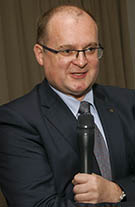
President of the Agency for Health Technology Assessment and Tariff System
Assessment and Tariff System. Doctor, specialist in public health, epidemiologist. Regional consultant in public health for the Małopolskie voivodeship. Deputy Director of the Institute of Public Health of the Faculty of Health Sciences at the Jagiellonian University Medical College. Participant and coordinator of many research projects, he worked in advisory teams to, i.a. the Ministry of Health, scientific societies, local governments, the European Commission, the World Bank. top
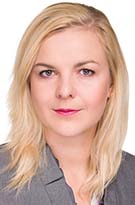
An advocate and Senior Associate with Pharmaceutical Law Team and Litigation Team at Dentons' Warsaw office. Ewa advises on pharmaceutical law and reimbursement for drugs and medical devices. She worked for the National Health Fund and the Health Ministry. Ewa was Deputy Director of Health Ministry's Department of Drug Policy and Pharmacy, where her responsibilities included statutory drafting, including the legislation amending the Drug Reimbursement Act (to introduce reimbursement for medical devices) and the Pharmaceutical Law Act, as well as the formulation of proposals for the Clinical Trials Act. Ewa also dealt with administrative and judicial proceedings commenced on applications to provide reimbursement and determine official sale prices for drugs, foodstuffs for particular nutritional uses and medical devices. She was a member of Council for Pricing. top
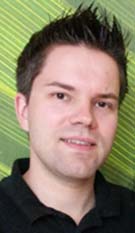
Research methodologist at the McMaster GRADE Centre in the Department of Health Research Methods, Evidence, and Impact (McMaster University, Hamilton, Canada). He specializes in evidence synthesis, guideline development methodology, and the guideline development process. As a member of the GRADE (Grading of Recommendations Assessment, Development and Evaluation) Working Group, his focus is on application and training on the GRADE approach for systematic reviews and guidelines. His main research activities include systematic reviews and the development of clinical practice guidelines in collaboration with various medical specialty societies, healthcare organizations, and ministries of health. He completed his graduate training in the Health Research Methodology program at McMaster University. top
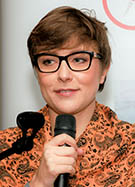
President of CEESTAHC Society, CEO of MedInvest Scanner, Vice President of HTA Consulting.In HTA Consulting, she is responsible for the strategic development of the company through research and services development, new product launch and marketing. Ms. Wladysiuk main and primary aim is to provide high quality information or data based on evidence based medicine or health technology assessment methodology not only in Poland but in Europe and Asia. Key role of her work is to improve patient outcomes through better healthcare decisions. In CEESTAHC she was responsible for the establishing and providing wide connection platform for discussion for all stakeholders in health care system. CEESTAHC mission is to improve the quality of health care systems value with the use of evidence. She graduatd Medical Academy in Lublin and MBA, economy in Kozminski Academy in Warsaw. She was Member of HTAi Annual Meeting in 2006-2008. top
Previous editions
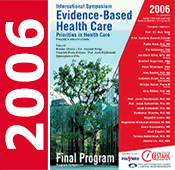
Zobacz edycję 2006
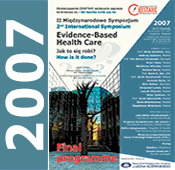
Zobacz edycję 2007
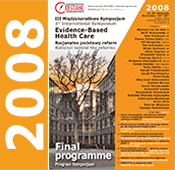
Zobacz edycję 2008
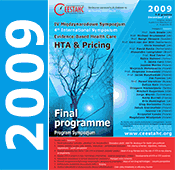
Zobacz edycję 2009
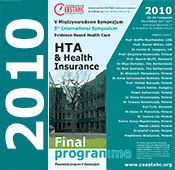
Zobacz edycję 2010
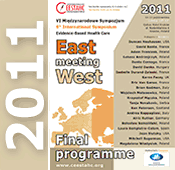
Zobacz edycję 2011
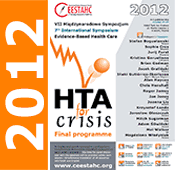
Zobacz edycję 2012
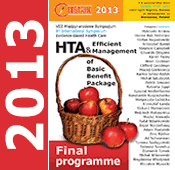
Zobacz edycję 2013
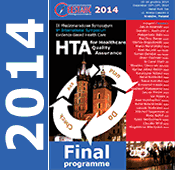
Zobacz edycję 2014
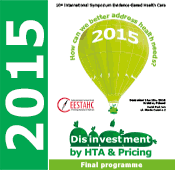
Zobacz edycję 2015
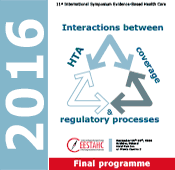
Zobacz edycję 2016
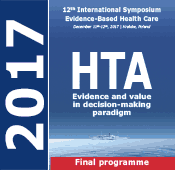
Zobacz edycję 2017
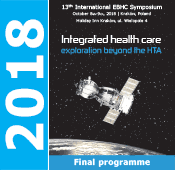
Zobacz edycję 2018
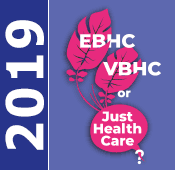
Zobacz edycję 2019
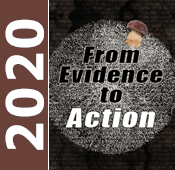
Zobacz edycję 2020

Zobacz edycję 2021
